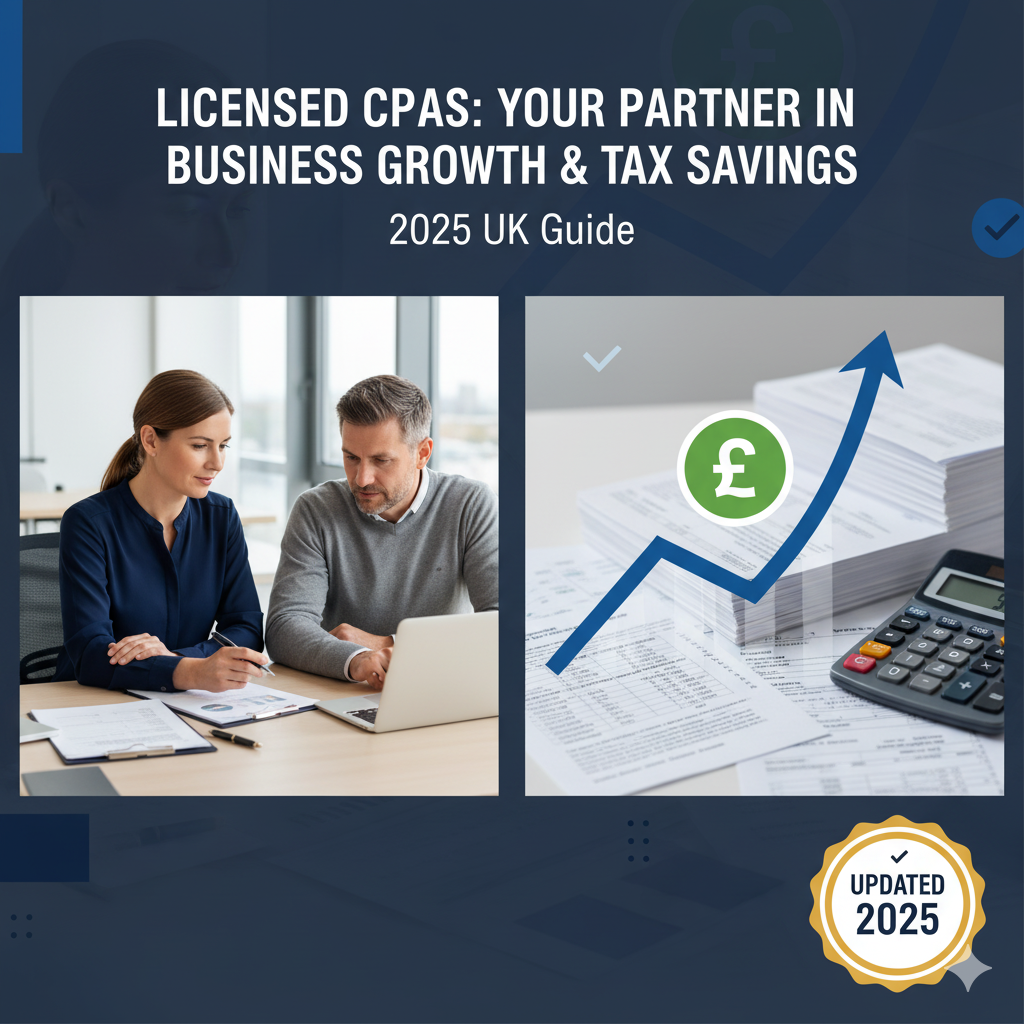
Here’s something most business owners discover too late: the difference between doing your taxes and actually saving money on them isn’t about working harder—it’s about who’s sitting across from you when April rolls around.
I’ve watched countless entrepreneurs juggle spreadsheets at midnight, convinced they’re “saving money” by handling their own books. Then tax season hits, and suddenly they’re facing penalties they didn’t see coming, or worse—missing deductions that could’ve funded their next hire. That’s the thing about tax law: it doesn’t reward effort. It rewards expertise.
That’s where a licensed certified public accountant enters the picture. Not as an expense you grudgingly pay, but as the person who spots opportunities you didn’t know existed. The one who turns “we can’t afford that” into “actually, there’s a strategy for this.”
Let’s talk about what that actually looks like for your business.
The Credential That Actually Matters
Strip away the jargon for a moment. A licensed certified public accountant isn’t just someone who’s good with numbers—they’ve passed one of the most rigorous professional exams out there, logged thousands of hours under supervision, and maintain continuing education requirements that would make your head spin.
Why does this matter to you? Because when tax authorities come knocking (and statistically, they will at some point), you want someone in your corner who speaks their language fluently. Someone who’s legally authorised to represent you before HMRC. Someone who carries professional liability insurance because they’re held to standards that regular bookkeepers simply aren’t.
But here’s what the credential doesn’t tell you: the best CPAs don’t just prevent disasters. They architect growth.
Beyond the Spreadsheet: Strategic Tax Advisory That Actually Moves Needles
Most businesses approach taxes like a rear-view mirror—looking backwards once a year, tallying up what happened, and hoping for the best. A proper licensed certified public accountant flips that entirely. They’re looking forward, twelve months at a time, asking questions like:
- Should you capitalise that equipment purchase or expense it?
- Is your current business structure costing you thousands unnecessarily?
- What’s the tax impact of that expansion you’re planning for Q3?
This is where proactive tax advisory solutions become less about compliance and more about competitive advantage. Firms that do business with Ask Accountant in London, such as those, are invariably finding themselves paying more over the years but without their intention to do anything wrong, but simply because they were not aware of what they had not known.

The Best Buys (Or Freebies) You Never Made.
I will provide you with a real-life example. Suppose you are thinking of taking on a partner. Your licensed certified public accountant must immediately mark:
- Partnership vs. LLP vs. limited company- all have dissimilar tax implications.
- Mutually-optimal profit-sharing plans.
- Ways to get out that won’t detonate any tax bombs.
You miss such discussions in the early stages and you are creating a business whose foundation could give way at the least of moments.
The Hidden Expenses of DIY Accounting (And They’re Not What You Think)
Sure, accounting software is cheap. Maybe £30 a month. But what’s the cost of:
- Three hours every week reconciling accounts that a professional could handle in 45 minutes
- That £8,000 R&D tax credit you didn’t realise you qualified for
- The VAT registration threshold you accidentally crossed without proper preparation
- Penalties for late filings because you didn’t know the deadline changed
One client I know spent £1,200 on penalties that year. His response when he finally hired a licensed certified public accountant? “I should’ve done this two years ago.” The CPA found £4,300 in overlooked deductions in the first review. Do the maths.
| Business Stage | DIY Cost (Time + Mistakes) | CPA Investment | Typical Annual Savings |
| Startup (£0-50k revenue) | £2,500-4,000 | £1,200-2,000 | £1,500-3,000 |
| Growing (£50k-250k) | £5,000-8,000 | £2,500-4,500 | £4,000-12,000 |
| Established (£250k+) | £10,000-20,000+ | £5,000-10,000 | £15,000-50,000+ |
Note: DIY costs include business owner’s time at £50/hour plus average penalties and missed opportunities

When Bookkeeping Becomes Business Intelligence
Here’s where things get interesting. Most people think bookkeeping means “recording what happened.” But when a licensed certified public accountant handles your books, they’re creating a diagnostic tool for your entire operation.
They notice:
- Your profit margins are shrinking in one product line (and can tell you exactly why)
- Cash flow patterns that suggest you should negotiate different payment terms with suppliers
- Cost structures that indicate it’s time to hire, or conversely, that you’re overstaffed in one department
This is business advisory disguised as number-crunching. The firms doing this well—like Ask Accountant’s team at 178 Merton High St, London SW19 1AY—treat your P&L like a patient chart. They’re not just recording symptoms; they’re diagnosing health and prescribing growth strategies.
The CIS Labyrinth (And Why Construction Firms Desperately Need CPAs)
If you’re in construction, you already know the Construction Industry Scheme is its own special circle of hell. The CIS claims and refunds process? Even more Byzantine.
A licensed certified public accountant specialising in construction doesn’t just file your CIS returns. They:
- Identify whether you should be registered as a subcontractor or not (this changes everything)
- Catch HMRC errors in deduction calculations (happens more than you’d think)
- Claim refunds you didn’t realise were sitting there
- Set up systems so you’re never scrambling at month-end
One subcontractor I spoke with had £11,000 in unclaimed CIS deductions spanning 18 months. He’d been filing everything “correctly”—he just didn’t know the rules allowed for certain claims. His accountant found them in an afternoon.
Quick Warning: HMRC audits construction businesses at higher rates than other industries. Having a licensed certified public accountant who knows CIS inside-out isn’t optional—it’s protection.
Inheritance Tax: The 40% Surprise Nobody Plans For
Let’s shift gears entirely because inheritance tax is where I see families get absolutely blindsided.
You’ve spent decades building a business or property portfolio. Maybe you’ve got £500,000 in assets, maybe £2 million. Either way, without proper planning, your beneficiaries could lose 40% to the taxman. Forty percent.
A CPA with estate planning expertise doesn’t just help you file inheritance tax returns—they help you structure ownership so less of it is taxable in the first place:
- Business property relief (can reduce IHT to £0 if structured correctly)
- Trust arrangements that protect assets
- Gifting strategies with seven-year lookbacks
- Life insurance policies written in trust
This isn’t something you figure out after someone passes. This is planning you do now, while you can still make moves. Ask Accountant’s tax advisory solutions include these conversations because they understand that business success means nothing if you can’t pass it on intact.
Auto-Enrolment: The Compliance Headache That Catches Everyone
Remember when auto-enrolment pensions became mandatory? Yeah, me too. What a mess.
If you’ve got employees, you’re legally required to:
- Assess who’s eligible
- Enrol them in a qualifying scheme
- Make employer contributions
- Submit regular declarations to The Pensions Regulator
- Re-enrol people every three years
Miss any of this? Fines start at £400 and escalate fast. A licensed certified public accountant handling your auto-enrolment doesn’t just set it up—they manage the ongoing compliance, calculate contributions correctly, and keep you ahead of declaration deadlines.
For small business accounting services, this kind of regulatory burden can be crushing. But when it’s handled by professionals who do this for dozens of clients? It becomes routine. Background noise whilst you focus on actual business problems.
What “Business Growth Planning” Actually Means
I’m going to be blunt: most “business growth planning” is consultant-speak for vague advice and expensive PowerPoint decks.
But when a licensed certified public accountant does business growth planning, it’s anchored in your actual numbers. They’re looking at:
- Cash flow projections that tell you when you can afford to expand (or when you need to pump the brakes)
- Scenario modelling: What happens to your tax liability if revenue increases 30%?
- Financing options: Should you take on debt, seek investors, or bootstrap?
- Profitability by client/product: Where are you actually making money?
This is business advice backed by data, not hunches. It’s why the best accountants feel less like number-crunchers and more like co-pilots for your company’s trajectory.
| Growth Question | What Your CPA Analyses | Typical Outcome |
| Should we hire? | Revenue per employee, profit margins, cash reserves, seasonal patterns | Data-backed yes/no with optimal timing |
| Can we afford this investment? | ROI projections, tax implications, financing costs | Break-even timeline + best funding approach |
| Should we expand locations? | Current location profitability, overhead ratios, market data, cash flow impact | Go/no-go with risk assessment |
| Pricing strategy changes? | Cost structure, competitor analysis, profit margins by service | Recommended pricing with revenue impact model |
The Conversation You Should Have (Before You Actually Need It)
Here’s my advice: don’t wait until you’re drowning in receipts or facing an HMRC enquiry to find a licensed certified public accountant. Have the conversation now. Most good CPAs offer initial consultations where they’ll review your situation and identify opportunities.
Ask them:
- What industries do you specialise in?
- How do you communicate? (Monthly check-ins? Quarterly reviews? Emergency text line?)
- What’s your approach to aggressive vs. conservative tax strategies?
- Can you show me examples of tax savings you’ve found for similar businesses?
If you’re in London and looking for comprehensive accounting and bookkeeping combined with actual strategic advice, firms like Ask Accountant (+44(0)20 8543 1991) offer the full spectrum—from basic compliance to complex tax planning. They handle everything from business accounting services to specialised areas like CIS claims and refunds, inheritance tax planning, and proactive tax advisory solutions. But wherever you are, find someone who treats your business like it matters. Because it does.

The Bottom Line (See What I Did There?)
A licensed certified public accountant is either an expense or an investment. If they’re just filing your taxes, they’re an expense. If they’re finding deductions, preventing penalties, advising on structure, and helping you make smarter decisions? That’s an investment that pays dividends.
Those businesses that develop in a sustainable manner, the ones that outlive economic crises and the ones that see chances, have someone in their corner who knows the tax code and the business strategy. Someone who can say to them, before they commit an expensive mistake, keep your hands off, and, when they see an opportunity, here.
That’s not a luxury. That’s infrastructure.
Frequently Asked Questions
Why is a licensed certified public accountant different than a regular accountant?
A licensed certified public accountant has successfully completed strenuous examination (CPA exam in the US, or similar professional training such as ACA/ACCA in the UK), has completed supervised work experience, and must continue with education requirements. They have legal permission to represent client before tax authorities and have professional insurance. Ordinary accountants might possess experience but do not possess the credentials and authorisations.
What is the average cost of a certified public accountant?
Depending on the complication and region, the fee is all over the place. For small business accounting services, expect £1,200-£4,000 annually for basic compliance. More comprehensive business accounting services including advisory typically run £3,000-£10,000+ annually. Complex situations (multiple entities, international operations) cost more. Always ask for detailed fee structures upfront.
When should a small business hire a CPA?
Ideally, before you even start—to help you choose the right business structure. Realistically, hire one when: you have employees, your revenue exceeds £85,000 (VAT threshold), you’re juggling multiple income streams, you’re considering expansion, or you’re spending more than 5 hours weekly on financial admin. If you’re already facing tax problems, hire one yesterday.
Can a licensed certified public accountant help with business growth, not just taxes?
Absolutely. The best CPAs provide business advisory services including cash flow planning, profitability analysis, financing strategies, and growth modelling. They can identify which products/services are actually profitable, when you can afford to hire, and how to structure deals. They’re seeing patterns across dozens of businesses and bring that intelligence to yours.
What do I prepare in order to my first meeting with a CPA?
Bring: past 2-3 years of tax returns, previous year financial statements, bank statements, list of assets and debts, information regarding business structure, and any particular questions or concerns. You need not be petty about everything being in perfect order, that is one of the jobs they are being paid to do is to devise superior systems.







